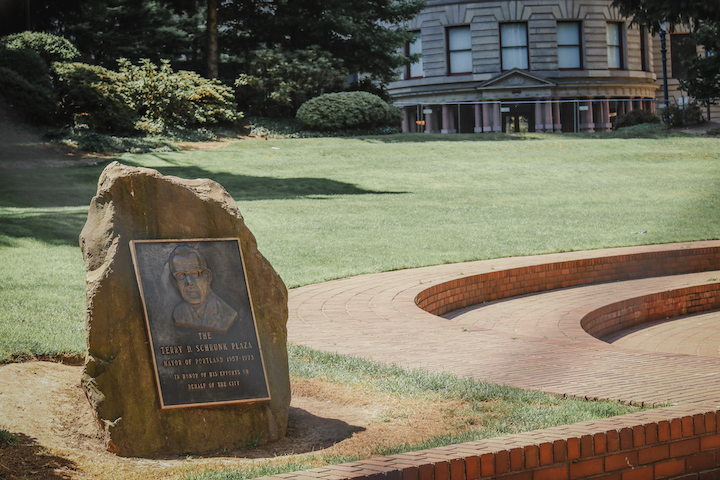I can appreciate the fact that former Portland Mayor Terry Schrunk’s descendants remember him fondly. But that doesn’t mean we should honor him and his legacy.
I am no monster; I am in no way someone who would try to force the memory of someone I am not fond of from the minds of their family. Yet, on that same token, I believe in the fairness of an accurate historical picture. In this picture, Schrunk holds an infamous place in the queer history of Portland; in his multiple term tenure, Schrunk harassed and oppressed queer Portlanders constantly, all in the name of restricting free expression, free association and the very fundamentals of life for anyone his office deemed a pervert.
To make matters far worse, Schrunk sat idly by as his police force terrorized Portland’s beleaguered Black population throughout his term.
As such, a plaza in his memory shortly after his death, wedged between a courthouse and city hall, two supposed defenders of civil liberties, is not the honor its original naming might suggest. To heighten the contradictions still further, the plaza rests on top of what used to be several businesses and rooming houses. Among these businesses, there was once a bathhouse, but now it is simply a green park increasingly famous for the hostility of law enforcement towards the supposed degenerates within its confines.
It does not make sense for Portland to continue to allow the federal government to hold on to this name, especially now that the history of Schrunk is a lot more accessible and its impact on marginalized people more understood. An honest and fair appraisal of Schrunk would not justify the naming honor.
Schrunk’s entry into public service came via the county sheriff’s office and ended at City Hall by the time of his death. During his tenure, Schrunk targeted not only the common scourge of gambling rooms, but also turned his attention to the vigilantly watched LGBTQ+ community, arming himself with legal implements meant to target LGBTQ+ bars and giving his police tools of violence to target the Black community. His clear zeal for the job meant he was extremely efficient in what he’d done, and by the time it was in full fledge, His efforts included a campaign against printed “obscene” materials and attempts with Councilmember Frank Ivancie to yank tavern and bar licenses in order to unsubtly push LGBTQ+ bars out of business while bulldozers were humming at the Legacy Emanuel Medical Center site and riots shook Albina.
Why is it, then, that Schrunk still gets this honor?
Were we talking about another mayor, one with a bit more restraint, then perhaps Schrunk might have been less about public safety and more about the trying times of his administration. Instead, we are left to ponder the impacts of a terribly effective homophobe who is now permanently enshrined with a large tract of land named in his honor. This kind of veneration is not mandatory, however, and considerations must be made for a different direction for the plaza.
Among the possibilities are renaming the spot after famous LGBTQ+ heroes in Portland—for example, Kathleen Sadaat, an activist with roots running back decades. Another possibility would be to not name the plaza after a person at all. One possible name of the sort is the 1926 Plaza, so-named because that was the year that the Oregon Constitution was finally rid of its overt clauses barring Black emigration to the state, a reminder of the original sins of Oregon.
The renaming of Schrunk Plaza shouldn’t be the end of this kind of reckoning with history, but should instead spawn a steady reassessment of the nature of Portland’s built environment and how it favors people who championed the very systems that have created the marked inequalities of the current city. With federal overstep undermining the health and safety of marginalized Portlanders, it is only right that this process begins with the full-throated support of the Mayor and Portland City Council.
Here, in this important moment, it is necessary we begin to see the good work of the consciences of those in power as they have this opportunity before them to begin to unmake the sins of Portland’s past. While ceremonial in nature, this kind of readdressing of an honor such as that given to Schrunk can serve as a soul-building exercise. The worry of erasing history is not valid here, as it is not in general, since there is plenty to know about Schrunk that is available in history texts. The resulting recognition he received by having a plaza named after him should thus be revoked.
